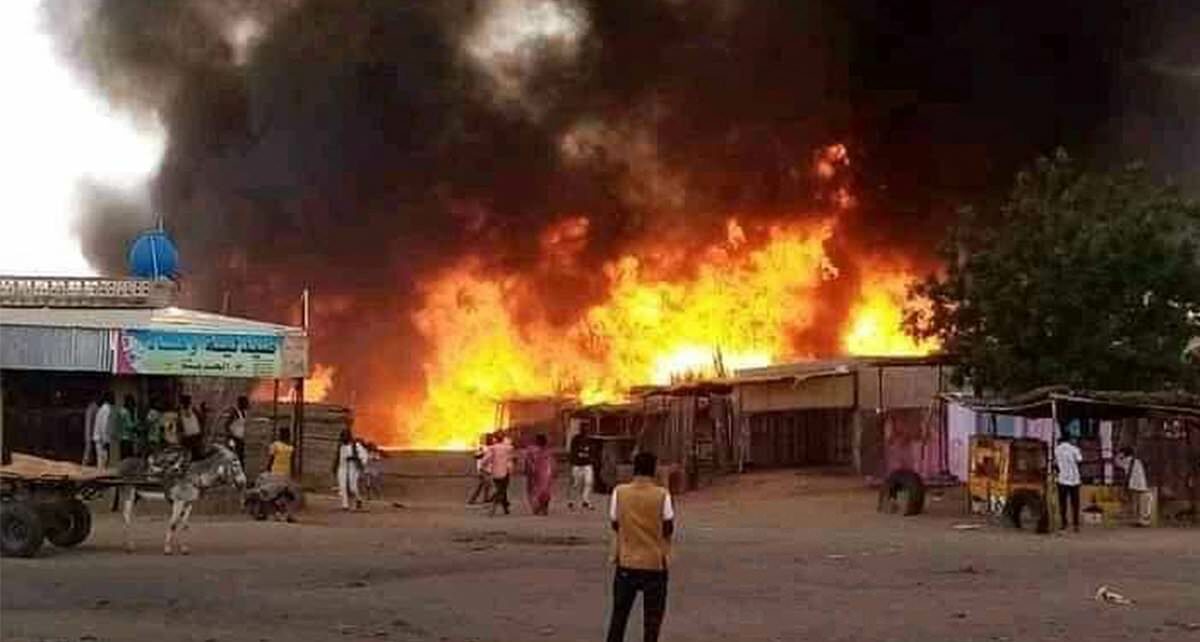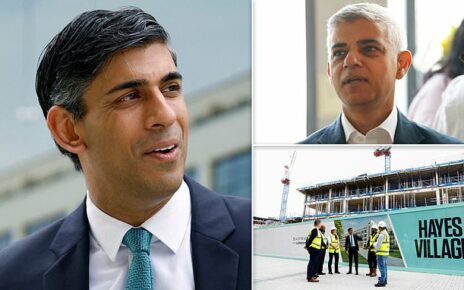Ukraine special services ‘likely responsible’ for drone strikes on Wagner-backed militia group in Sudan currently waging civil war, official claims
- Sudan’s most powerful military factions have been locked in war since April
- Wagner Group PMC has supported the RSF paramilitary group with weapons
Ukrainian special forces may have been responsible for attacks on a Wagner-backed militia in Sudan, a Ukrainian military official has revealed.
Speaking to CNN, the anonymous source said a string of drone attacks against the Rapid Support Forces (RSF) earlier this month were carried out by a ‘non-Sudanese’ military, claiming ‘Ukrainian special services were likely responsible’.
The attacks began on September 8, two days after Wagner Group sent gun-laden trucks to an RSF garrison in al-Zurug, southwest Sudan. The RSF has been embroiled in a power struggle with Sudanese Armed Forces (SAF) since April 15, 2023.
At least six strikes targeted trucks on Shambat Bridge and another eight hit vehicles, buildings and personnel near RSF positions in Omdurman and Ombada. Analysis of drone footage by CNN revealed Ukrainian text seen on the drone controller.
Whistleblowers in Chad told CNN that the Wagner convoy moved through Chad, where Wagner Group does not currently have an established presence, potentially signalling an expansion of Russia and Wagner’s influence on the continent.
Ukrainian operations in Africa would also mark a significant development in the ongoing conflict in eastern Europe.
Ukraine has not officially claimed responsibility for the attacks.

A man stands by as a fire rages in a livestock market area in al-Fasher, the capital of Sudan’s North Darfur state, on September 1, 2023, in the aftermath of bombardment by the RSF

RSF fighters ride in the back of a technical vehicle in the East Nile district of greater Khartoum, April 23, 2023

PMC Wagner Group has a presence spread out across Russian-influenced African nations
Some critics have been skeptical of the claims made by the Ukrainian source.
A Sudanese military official told CNN they were not aware of Ukrainian operations in Sudan.
Who are the RSF?
The Rapid Support Forces are a paramilitary group, which Sudan’s intelligence service created from the Janjaweed militia in 2013.
The Janjaweed militia had worked closely with the Sudanese military and police forces in the War in Darfur (2003-20).
The war was fought between an alliance of rebels and the Sudanese government, backed by the Janjaweed and supported by Libya, Russia, Iran and China, among others.
Rebel groups accused the government of oppressing non-Arabs in western Sudan.
The war saw a brutal campaign of ethnic cleansing against non-Arabs, resulting in the deaths of hundreds of thousands of civilians and a major humanitarian crisis as refugees fled the country.
While the UN and African Union managed to establish a peacekeeping mission to help negotiate the end of the conflict in 2020, the RSF became a branch of the Sudanese Armed Forces (SAF) in 2013.
It has since been deployed in a number of roles domestically and in foreign conflicts, including in Libya and Yemen.
The RSF is accused of numerous human rights abuses, and reportedly tied to Russia’s Wagner Group mercenaries, active in Ukraine
Wagner Group has maintained a presence in Sudan since 2017, and has arms spread out across the continent.
In April, founder Yevgeny Prigozhin claimed ‘not a single Wagner PMC [private military company] fighter has been present in Sudan’ for over two years.
But evidence has mounted of Wagner arming the RSF with missiles to fuel its war against the Sudanese Armed Forces (SAF).
Footage from July 2022 also appeared to show mercenaries training Sudanese forces in parachute-landing exercises.
The Global Initiative Against Transnational Organized Crime [GI-TOC] assessed in April that Wagner sought both influence and material gain in Sudan.
‘The main objective of the Russians in Sudan is not to protect the Khartoum political power, but essentially to benefit immensely from the country’s mineral resources.’
Russia has likewise agreed trade deals in the past to mine gold in Sudan.
At least 5,000 people have been killed and over 12,000 wounded in the ongoing war in Sudan, according to Volker Perthes, the U.N. envoy in the country, who announced his resignation last week.
The actual casualty toll, he said, is likely much higher.
More than 2.5 million people have fled their homes, including over 1 million who crossed into Sudan’s neighboring countries, according to the U.N.’s migration agency.
More than 1,200 children under the age of five have also died as a result of the conflict, which has raged for the last five months with few ceasefires.
The U.N.’s refugee agency warned on Tuesday that a deadly combination of measles and malnutrition were taking their toll on Sudan’s civilian population.
The UNHCR said the deaths, between May 15 and September 14, were documented by its teams in the While Nile province, where thousands of Sudanese have sheltered as fighting has raged for six months between rival generals, in the capital of Khartoum and elsewhere.
‘Dozens of children are dying every day – a result of this devastating conflict and a lack of global attention,’ said the U.N. High Commissioner for Refugees, Filippo Grandi.
The fighting wrecked the country’s health care system, with many hospitals and medical facilities out of service.

Yevgeny Prigozhin, the late head of Wagner Group, which has been in Sudan since 2017

Fierce clashes broke out across the capital Khartoum and the sister city of Omdurman in April
Sudan has been governed by a council of generals led by current de facto president Abdel Fattah al-Burhan since a military junta tasked with transitioning the country to democracy was overthrown in a 2021 military coup.
READ MORE: Putin’s other battle… for influence in Africa: How Kremlin’s shady meddling is bearing fruit after Russian flag-waving protesters took to the streets in Niger to back a coup against the government and its Western allies

al-Burhan’s deputy, Mohamed Hamdan Dagalo, better known as Hemeti, is commander of the 100,000-strong RSF.
Tensions have since grown as the SAF and RSF have competed for legitimacy amid wider discussions about the future of the country.
In December 2022, civilian groups that had been sidelined by the 2021 coup signed an initial deal with the military to start a new two-year political transition and appoint a new civilian government.
On 5 April 2023, the final signing for the deal was delayed a second time, amid disputes over whether the army would be placed under civilian oversight in a new administration, and how the RSF would be integrated into the armed forces.
Civilian groups also seek justice for alleged war crimes by the military and its allies.
In this volatile environment, the relationship between Burhan and Hemeti became strained, leading ultimately to conflict as RSF personnel were tactically redeployed into roles around Sudan.
Both sides initially accused each other of starting the conflict, and have been loathe to negotiate. Both have called for the other side to surrender.
The region remains geopolitically important and western allies fear the possible establishment of a Russian base on the east coast on the Red Sea, to which some military leaders have been receptive.
Sudan has been trapped in conflict on-and-off since declaring independence in 1955, recognised on 1 January 1956.
Source: Read Full Article

